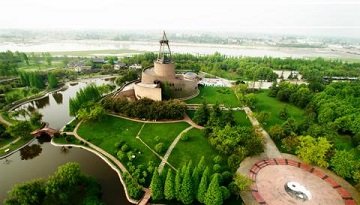Chapter 11: The Insecto-Reptoid Heads of Sanxingdui—三星堆的昆虫爬虫类的头, 11-1: Chengdu. Shit. 成都. 该死.
10,000 Years of Strangeness: A Paranormal Primer for Ancient and Modern China
Part III: Mysteries and Legends
Chapter 11: The Insecto-Reptoid Heads of Sanxingdui—三星堆的昆虫爬虫类的头, 11-1: Chengdu. Shit. 成都. 该死.
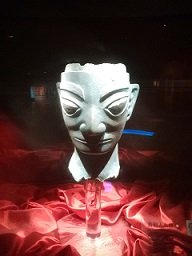
Previous Chapters 前章: Part 1: Chapter 1, Ch 2, Ch 3, Ch 4, Ch 5-1, Ch 5-2, Ch 5-3, Ch. 6
Previous Chapters 前章: Part 2: Chapter 7, Ch 8-1, Ch 8-2, Ch 8-3, Ch 8-4, Ch 8-5, Ch 9
Previous Chapters 前章: Part 3: Chapter 10
One of the most spectacular cultures in Chinese history was brought to my attention by another superb student whose English name is Kathy. She’s one of those gorgeous tech-girl hipsters from Chongqing, legendary for its beauty queens, that works at Tencent. She doesn’t flaunt her beauty, but ops for a nerdy look that matches her career, but spend a little time with her and her appealing features and creamy smooth white skin sneak up on you, and that’s when you notice the fire in her eyes. Her completely child-like enthusiasm and speech belie her total lack of conceit, a characteristic usually lacking in extremely beautiful girls. She has a small upturned nose that squeals cuteness and lips like Snow White. It was hard to concentrate.
When she first pitched the idea of including the Sanxingdui in my book, I offered to buy her lunch if she’d fill me in on it. We met at the Subway just outside the Shen Da Metro station. Shen Da is Chinese shorthand for Shenzhen University that combines the first character of Shenzhen (深圳) with the first character for University (大学). I think I had the tuna and she had the spicy Italian, perhaps because it reminded her of me.
True to form, she had prepared splendiferously by putting together the best English language write up of the Sanxingdui I had seen after two weeks of web research. It was illustrated with spectacular color photos of bronze and gold artifacts focusing on the gold scepter, ritualistic or ceremonial bronze trees, and bronze insecto-reptoid heads with greatly exaggerated and even stalked eyes. Most of these heads grin menacingly.
Kathy was a font of information about this culture and had meticulously translated passages from Chinese academic papers and articles for me in her presentation. She also pointed out that the site was so close to Chengdu, you could make a day trip of it from there.
My wife of 3 months and I had never traveled together beyond Guangzhou or her hometown, so I decided it was high time we did. We could do a long weekend in Chengdu, my favorite city in China, take in the Sanxingdui, and then whatever else she wanted to do. The panda breeding facility would be high on her list for sure. Chinese girls always love cute, and there ain’t much else cuter than acres and acres of pandas.
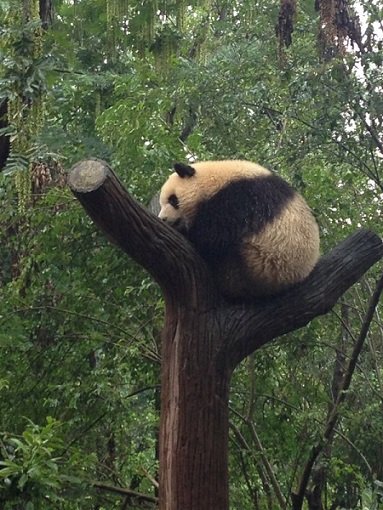
Now let me begin by saying, the reason people in China take long weekends is because at least one of the days will be wasted at the airport due to flight delays caused by “air route weather”. Beautiful day in Shenzhen, beautiful day in Chengdu, but we can’t leave because of “air route weather.” That is literally what the big board says in English: “Indefinite delay due to air route weather.”
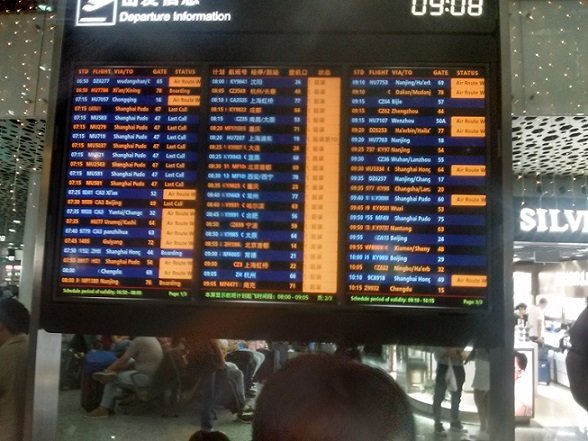
The flight paths in China are very restricted, so airlines can’t just take off and fly around stuff. They have to strictly adhere to permissible flight plans. Or so I’m told.
So you’re starting to get an idea of what our first day was like. We woke up at 4:30 in the morning to catch an 8:15 flight. I hadn’t flown domestically in China for several years, but I have to say they DO A MUCH BETTER JOB THAN TSA AT SECURITY! Unless of course you use Dulles or National airport which are suspiciously faster and friendlier than every other airport in America.
In my pre-dawn grogginess I forgot to transfer my Swiss Army knife to my checked bag, and they don’t allow you to take lighters at all, not even in checked bags. So I had to leave them at the airport. This is one area where the Chinese far exceed the TSA in service: they let you check the items with security and retrieve them on your return at no additional cost to you. Hurray for China!
The flight was ultimately delayed four hours. My wife and I both were afraid to fall asleep because we didn’t want to miss the boarding call. When it finally came, we were se spaced out, I left my half-read copy of Richard C Hoagland’s Dark Mission in the departure lounge. The trip was off to an utterly horrible start. I was sure that book would be irreplaceable in China and thought about how expensive it would be to re-order from the states with the shipping charges.

My wife fell asleep almost as soon as we sat down, even before takeoff. I fell asleep soon after. We arrived in Chengdu sometime after 3:00 pm, so our day at the Panda reserve was now shot, but we still had a chance at dinner with a friend and former co-worker who had moved to Chengdu a few years before.
We hopped in a taxi and headed for the hotel, when the next inconvenience reared its ugly head. The taxi driver didn’t want to go all the way to the hotel. He surmised there would be too much traffic, which would prevent him from returning to the airport fast enough to get another fat fair. He didn’t mention that last part, but it’s a fair speculation.
He dropped us at a metro station five stops away from our hotel. This doesn’t happen in Shenzhen. They have a much more professional taxi corps. When we got to the metro station for our hotel, one side of the street was completely derelict and surround by the blue metal fencing that surrounds pending construction sites all over China. Across the street was a row of small shops. The hotel entrance was not visible. I schlepped my suitcase up the block to see further across the street and finally spotted the Lazy Bones Youth Hostel. It looked infinitely more inviting than anything else in that neighborhood, but then that’s how they manage to afford the rates they offer.
Since a steel barrier ran down the center line of the street for the full length of the block to block jaywalkers such as myself, we had to back track to the corner where we came out of the metro and back up the block.
The Lazy Bones had a very cheerful entrance and warm, comfortable environment. The lobby had a lounge area with plenty of English books as is usually the case with youth hostels in China, including just about every addition of the Lonely Planet Guide to China since 1999, as is usually the case with youth hostels around China.
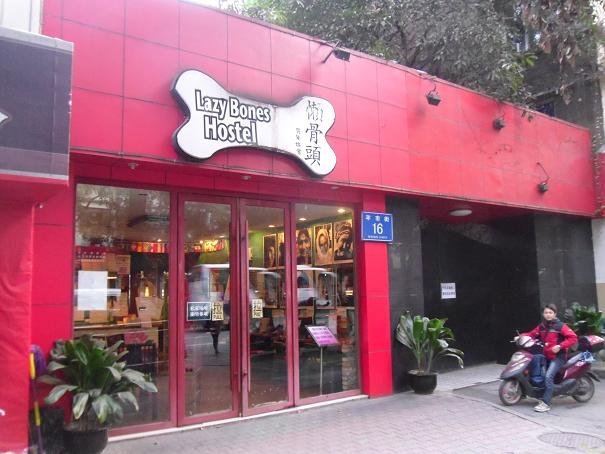
Traditionally I had stayed at Sam’s Guesthouse in Chengdu, but they apparently went out of business recently. Lazy Bones seemed the best choice of alternatives we found. Going past the reception desk was a large hall that functioned as bar, restaurant, and lounge. The whole place was filled with plants and quirky but warm décor that reflected its international clientele of young travelers. The walls and windows were plastered with hand-drawn pictures and post cards were shoved thickly under the glass table tops. The room had kind of an outdoor feel to it, even though it was indoors. The impression I got was that it was outdoors and that the hostel owners erected an inexpensive shelter to enclose it. Just outside this was an ivy-covered courtyard stuffed with more plants. The overall impression was DIY, friendly and relaxing.
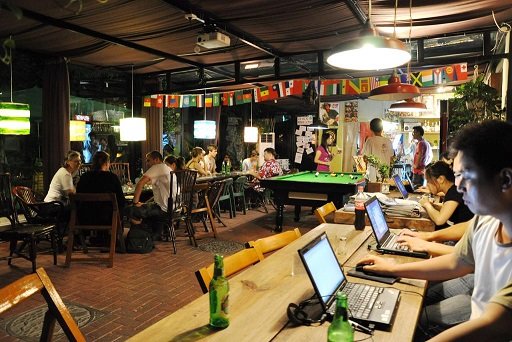
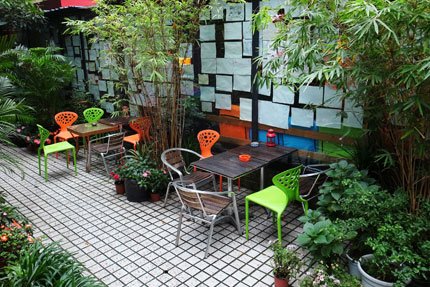
The room was on the fourth floor, not what I wanted with a bad knee in a knee brace, but the stairs all over Chengdu are shallower and less steep than anywhere else in the world and were tolerable. Going through the narrow dimly lit halls with their pumpkin painted walls and up the rickety wooden staircase, I felt like we were in a Hong Kong B-movie entering some dingy housing unit in Mongkok or something. This was not a bad feeling but had an air of romance and excitement about it. The room was small, clean and comfortable.
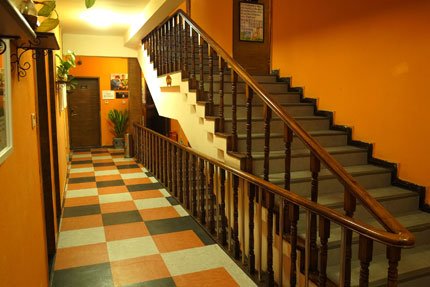
We barely had time to get cleaned up and relax for a few minutes before meeting Esther for a 6:30 dinner in a place we had no idea where it was or how far from the hotel. All we knew is that it was a hot pot place. Hot pot is the official food of Sichuan like crabs are the official food of Maryland.
Hot pot consists of a huge, dangerous cauldron of boiling hot water and oil in the middle of the table seasoned generously, very generously mind you, with Sichuan hot chili peppers, slabs of butter infused with chili pepper oil, and some other little round things I’ve never learned the name of that add an extra after-burn to the chilies. Food is brought raw to the table leaving it to the diners to place in the hot oil and cook. Then you fish it out with a couple of colander ladles to eat it. You also get the fixings for a dipping sauce you construct yourself: oil, chopped cilantro, chopped garlic, chopped ginger, and of course chopped chili peppers. Before the meal is over, your lips and tongue are agonizingly burning.
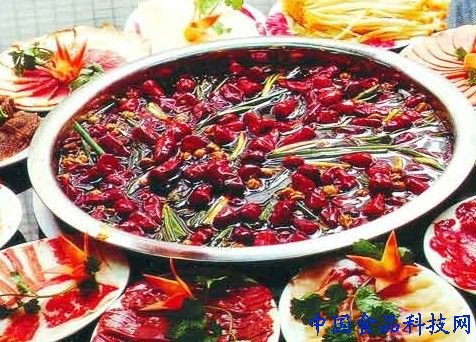
Esther sent me a message to go to the Ni Jia Qiao metro station (倪家桥地铁站) and walk from there. She had also sent a map via WeChat. We knew exactly where that was because it was the same metro station the ornery cab driver from the airport dropped us at. We came out a different exit than the one he let us off at and right at the top of the escalator was a Grandma’s Kitchen.
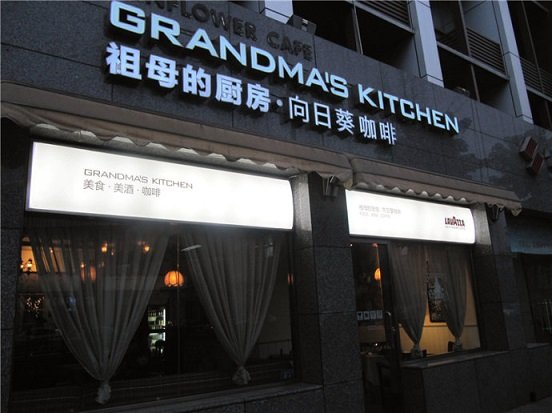
Grandma’s Kitchen is legendary among Asian travelers for its superb, very authentic American home-style cuisine. It was owned by an old lady from Texas who used family recipes and served up Texas-sized portions that were twice as good and less than half the price of Western food anywhere else in China. However, she sold the place in 2008 to some Belgian guy who immediately ruined it. The American country breakfasts with humongous omelets, heaping piles of home fries and half a side of bacon were purged from the menu. No more towering stacks of pancakes with maple syrup (corn syrup? Really?). No more bottomless cups of coffee. They even ruined the pie! Instead of the good ol’ top and bottom crust stuffed with cinnamony baked apples, they switched it to some effeminate form of decorative lightweight apple pie that esteems presentation above taste. I’ll say it—it’s gay! And they brought the price up to par with other Western restaurants. So they made it worse AND raised the prices.
This is a pet peeve of mine in China and has caused me to dislike Belgians and Eurofags in general. The nail in the coffin was replacing hardy, delicious home fries with McDonald’s style frozen hash browns in the shape of a triangle, a mass of grease and spud powder. I would like nothing more than to have my disdain for what that stinking Belgian bastard did to Grandma’s Kitchen be immortalized here in writing.
Fortunately, he kept the milkshakes. I made a mental note for later.
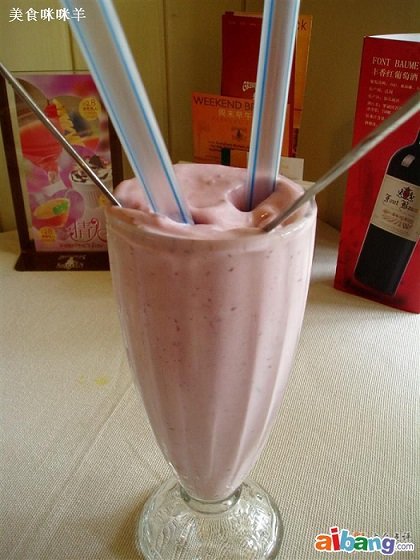
The best, and possibly only, real milkshake in China.
We looked at the map she sent us. It didn’t match where we were at all. It had a river we were supposed to walk along, but there was no river where we were. I thought I knew what river it was, the one the big ship and the food street are along, but that was nowhere near here.
We had to ask directions. We showed a security guard at some fancy building the map and our destination and he looked really confused. He spoke Chinese but my wife, who is Chinese, but couldn’t understand a goddamned word. This was a problem everywhere we went in Chengdu. The locals automatically speak the local language to anyone who is Chinese. When they realize they’re not Sichuanese, they switch to Mandarin, but, in the case of my wife and I anyway, it’s sometimes unintelligible.
So we had this map, and he was saying it was really far away from where we were. His “hei yuan” sounded enough like “hao yuan” (really far) for us to figure that much out. So then we showed him the address. By then another guard had come over, saw the address and promptly gave us simple directions in better Mandarin, or Putonghua as they say over here. We only needed to know one street and stay on it till we saw the joint. It was easy to find. All the time my wife complained that there was nothing unique about Chengdu, it looked just like any other big city in China. Indeed it had changed in the 6 or 7 years I’d been there. It even had a metro now of all things.
That hot pot restaurant was in the Yulin neighborhood of Chengdu, which is supposed to be kind of a trendy artsy fartsy area for fashionable youth, but to be honest there was absolutely no evidence of it being so at all.
The place was easy to find. We got there 20 minutes early and called Esther who told us to get a table. We caught up like old friends do, enjoyed the hot pot, which we learned was ranked among the top ten in China. I suggested capping the meal off with milkshakes and apple pie at Grandma’s Kitchen. It was on this visit that I saw the change in the pie (as of 2010 they were still doing it original Grandma’s style). So I had a fantastic strawberry milkshake, the wife had a caramel pudding (which was delicious), and Esther had some kind of kumquat drink. It seems like every fine dining place in China offers kumquat juice, or some kind of citrus juice with kumquats cut up in it.
So far, the wife was unimpressed with Chengdu, my favorite city in China (Perhaps formerly favorite now), and I was disappointed with myself and all the travel screw ups that had been ruining our trip thus far. Although I loved the hot pot, it was just OK for her. Being Cantonese, she greatly prefers the mild character of her own cuisine to Sichuan style. But as far as I was concerned the whole trip was based around my mission to explore the Sanxingdui anyway, everything else we did was incidental to that.
She informed me that the bus for Sanxingdui was leaving at 8:15 the next morning. But actually she wasn’t sure because one website said 8:30 and one said 8:15, so we’d better play it safe and get there for the 8:15. Great, another early wakeup call after the miserable day we just had traveling from Shenzhen. The only bright spot was the cheerful company of Esther and the invigorating meal.
We made our way back to the hostel to make an early night of it. My wife remarked that all we’ve done in Chengdu so far is ride the metro back and forth between Luo Ma Shi (骡马市) and Ni Jia Qiao. We hoped tomorrow would be better.
We rose bright an early the next morning and took the metro to Hua Xi Ba (华西坝), the nearest stop to the bus station. When we arrived, we found out that the bus to Sanxingdui actually leaves at 9:30! I got a vision of “Chef” from Apocalypse Now ranting “That’s typical! That’s fucking typical!”
Chapter 11: The Insecto-Reptoid Heads of Sanxingdui—三星堆的昆虫爬虫类的头, 11-1: Chengdu. Shit. 成都. 该死.

Previous Chapters 前章: Part 1: Chapter 1, Ch 2, Ch 3, Ch 4, Ch 5-1, Ch 5-2, Ch 5-3, Ch. 6
Previous Chapters 前章: Part 2: Chapter 7, Ch 8-1, Ch 8-2, Ch 8-3, Ch 8-4, Ch 8-5, Ch 9
Previous Chapters 前章: Part 3: Chapter 10
One of the most spectacular cultures in Chinese history was brought to my attention by another superb student whose English name is Kathy. She’s one of those gorgeous tech-girl hipsters from Chongqing, legendary for its beauty queens, that works at Tencent. She doesn’t flaunt her beauty, but ops for a nerdy look that matches her career, but spend a little time with her and her appealing features and creamy smooth white skin sneak up on you, and that’s when you notice the fire in her eyes. Her completely child-like enthusiasm and speech belie her total lack of conceit, a characteristic usually lacking in extremely beautiful girls. She has a small upturned nose that squeals cuteness and lips like Snow White. It was hard to concentrate.
When she first pitched the idea of including the Sanxingdui in my book, I offered to buy her lunch if she’d fill me in on it. We met at the Subway just outside the Shen Da Metro station. Shen Da is Chinese shorthand for Shenzhen University that combines the first character of Shenzhen (深圳) with the first character for University (大学). I think I had the tuna and she had the spicy Italian, perhaps because it reminded her of me.
True to form, she had prepared splendiferously by putting together the best English language write up of the Sanxingdui I had seen after two weeks of web research. It was illustrated with spectacular color photos of bronze and gold artifacts focusing on the gold scepter, ritualistic or ceremonial bronze trees, and bronze insecto-reptoid heads with greatly exaggerated and even stalked eyes. Most of these heads grin menacingly.
Kathy was a font of information about this culture and had meticulously translated passages from Chinese academic papers and articles for me in her presentation. She also pointed out that the site was so close to Chengdu, you could make a day trip of it from there.
My wife of 3 months and I had never traveled together beyond Guangzhou or her hometown, so I decided it was high time we did. We could do a long weekend in Chengdu, my favorite city in China, take in the Sanxingdui, and then whatever else she wanted to do. The panda breeding facility would be high on her list for sure. Chinese girls always love cute, and there ain’t much else cuter than acres and acres of pandas.

Now let me begin by saying, the reason people in China take long weekends is because at least one of the days will be wasted at the airport due to flight delays caused by “air route weather”. Beautiful day in Shenzhen, beautiful day in Chengdu, but we can’t leave because of “air route weather.” That is literally what the big board says in English: “Indefinite delay due to air route weather.”

The flight paths in China are very restricted, so airlines can’t just take off and fly around stuff. They have to strictly adhere to permissible flight plans. Or so I’m told.
So you’re starting to get an idea of what our first day was like. We woke up at 4:30 in the morning to catch an 8:15 flight. I hadn’t flown domestically in China for several years, but I have to say they DO A MUCH BETTER JOB THAN TSA AT SECURITY! Unless of course you use Dulles or National airport which are suspiciously faster and friendlier than every other airport in America.
In my pre-dawn grogginess I forgot to transfer my Swiss Army knife to my checked bag, and they don’t allow you to take lighters at all, not even in checked bags. So I had to leave them at the airport. This is one area where the Chinese far exceed the TSA in service: they let you check the items with security and retrieve them on your return at no additional cost to you. Hurray for China!
The flight was ultimately delayed four hours. My wife and I both were afraid to fall asleep because we didn’t want to miss the boarding call. When it finally came, we were se spaced out, I left my half-read copy of Richard C Hoagland’s Dark Mission in the departure lounge. The trip was off to an utterly horrible start. I was sure that book would be irreplaceable in China and thought about how expensive it would be to re-order from the states with the shipping charges.

My wife fell asleep almost as soon as we sat down, even before takeoff. I fell asleep soon after. We arrived in Chengdu sometime after 3:00 pm, so our day at the Panda reserve was now shot, but we still had a chance at dinner with a friend and former co-worker who had moved to Chengdu a few years before.
We hopped in a taxi and headed for the hotel, when the next inconvenience reared its ugly head. The taxi driver didn’t want to go all the way to the hotel. He surmised there would be too much traffic, which would prevent him from returning to the airport fast enough to get another fat fair. He didn’t mention that last part, but it’s a fair speculation.
He dropped us at a metro station five stops away from our hotel. This doesn’t happen in Shenzhen. They have a much more professional taxi corps. When we got to the metro station for our hotel, one side of the street was completely derelict and surround by the blue metal fencing that surrounds pending construction sites all over China. Across the street was a row of small shops. The hotel entrance was not visible. I schlepped my suitcase up the block to see further across the street and finally spotted the Lazy Bones Youth Hostel. It looked infinitely more inviting than anything else in that neighborhood, but then that’s how they manage to afford the rates they offer.
Since a steel barrier ran down the center line of the street for the full length of the block to block jaywalkers such as myself, we had to back track to the corner where we came out of the metro and back up the block.
The Lazy Bones had a very cheerful entrance and warm, comfortable environment. The lobby had a lounge area with plenty of English books as is usually the case with youth hostels in China, including just about every addition of the Lonely Planet Guide to China since 1999, as is usually the case with youth hostels around China.

Traditionally I had stayed at Sam’s Guesthouse in Chengdu, but they apparently went out of business recently. Lazy Bones seemed the best choice of alternatives we found. Going past the reception desk was a large hall that functioned as bar, restaurant, and lounge. The whole place was filled with plants and quirky but warm décor that reflected its international clientele of young travelers. The walls and windows were plastered with hand-drawn pictures and post cards were shoved thickly under the glass table tops. The room had kind of an outdoor feel to it, even though it was indoors. The impression I got was that it was outdoors and that the hostel owners erected an inexpensive shelter to enclose it. Just outside this was an ivy-covered courtyard stuffed with more plants. The overall impression was DIY, friendly and relaxing.


The room was on the fourth floor, not what I wanted with a bad knee in a knee brace, but the stairs all over Chengdu are shallower and less steep than anywhere else in the world and were tolerable. Going through the narrow dimly lit halls with their pumpkin painted walls and up the rickety wooden staircase, I felt like we were in a Hong Kong B-movie entering some dingy housing unit in Mongkok or something. This was not a bad feeling but had an air of romance and excitement about it. The room was small, clean and comfortable.

We barely had time to get cleaned up and relax for a few minutes before meeting Esther for a 6:30 dinner in a place we had no idea where it was or how far from the hotel. All we knew is that it was a hot pot place. Hot pot is the official food of Sichuan like crabs are the official food of Maryland.
Hot pot consists of a huge, dangerous cauldron of boiling hot water and oil in the middle of the table seasoned generously, very generously mind you, with Sichuan hot chili peppers, slabs of butter infused with chili pepper oil, and some other little round things I’ve never learned the name of that add an extra after-burn to the chilies. Food is brought raw to the table leaving it to the diners to place in the hot oil and cook. Then you fish it out with a couple of colander ladles to eat it. You also get the fixings for a dipping sauce you construct yourself: oil, chopped cilantro, chopped garlic, chopped ginger, and of course chopped chili peppers. Before the meal is over, your lips and tongue are agonizingly burning.

Esther sent me a message to go to the Ni Jia Qiao metro station (倪家桥地铁站) and walk from there. She had also sent a map via WeChat. We knew exactly where that was because it was the same metro station the ornery cab driver from the airport dropped us at. We came out a different exit than the one he let us off at and right at the top of the escalator was a Grandma’s Kitchen.

Grandma’s Kitchen is legendary among Asian travelers for its superb, very authentic American home-style cuisine. It was owned by an old lady from Texas who used family recipes and served up Texas-sized portions that were twice as good and less than half the price of Western food anywhere else in China. However, she sold the place in 2008 to some Belgian guy who immediately ruined it. The American country breakfasts with humongous omelets, heaping piles of home fries and half a side of bacon were purged from the menu. No more towering stacks of pancakes with maple syrup (corn syrup? Really?). No more bottomless cups of coffee. They even ruined the pie! Instead of the good ol’ top and bottom crust stuffed with cinnamony baked apples, they switched it to some effeminate form of decorative lightweight apple pie that esteems presentation above taste. I’ll say it—it’s gay! And they brought the price up to par with other Western restaurants. So they made it worse AND raised the prices.
This is a pet peeve of mine in China and has caused me to dislike Belgians and Eurofags in general. The nail in the coffin was replacing hardy, delicious home fries with McDonald’s style frozen hash browns in the shape of a triangle, a mass of grease and spud powder. I would like nothing more than to have my disdain for what that stinking Belgian bastard did to Grandma’s Kitchen be immortalized here in writing.
Fortunately, he kept the milkshakes. I made a mental note for later.

The best, and possibly only, real milkshake in China.
We looked at the map she sent us. It didn’t match where we were at all. It had a river we were supposed to walk along, but there was no river where we were. I thought I knew what river it was, the one the big ship and the food street are along, but that was nowhere near here.
We had to ask directions. We showed a security guard at some fancy building the map and our destination and he looked really confused. He spoke Chinese but my wife, who is Chinese, but couldn’t understand a goddamned word. This was a problem everywhere we went in Chengdu. The locals automatically speak the local language to anyone who is Chinese. When they realize they’re not Sichuanese, they switch to Mandarin, but, in the case of my wife and I anyway, it’s sometimes unintelligible.
So we had this map, and he was saying it was really far away from where we were. His “hei yuan” sounded enough like “hao yuan” (really far) for us to figure that much out. So then we showed him the address. By then another guard had come over, saw the address and promptly gave us simple directions in better Mandarin, or Putonghua as they say over here. We only needed to know one street and stay on it till we saw the joint. It was easy to find. All the time my wife complained that there was nothing unique about Chengdu, it looked just like any other big city in China. Indeed it had changed in the 6 or 7 years I’d been there. It even had a metro now of all things.
That hot pot restaurant was in the Yulin neighborhood of Chengdu, which is supposed to be kind of a trendy artsy fartsy area for fashionable youth, but to be honest there was absolutely no evidence of it being so at all.
The place was easy to find. We got there 20 minutes early and called Esther who told us to get a table. We caught up like old friends do, enjoyed the hot pot, which we learned was ranked among the top ten in China. I suggested capping the meal off with milkshakes and apple pie at Grandma’s Kitchen. It was on this visit that I saw the change in the pie (as of 2010 they were still doing it original Grandma’s style). So I had a fantastic strawberry milkshake, the wife had a caramel pudding (which was delicious), and Esther had some kind of kumquat drink. It seems like every fine dining place in China offers kumquat juice, or some kind of citrus juice with kumquats cut up in it.
So far, the wife was unimpressed with Chengdu, my favorite city in China (Perhaps formerly favorite now), and I was disappointed with myself and all the travel screw ups that had been ruining our trip thus far. Although I loved the hot pot, it was just OK for her. Being Cantonese, she greatly prefers the mild character of her own cuisine to Sichuan style. But as far as I was concerned the whole trip was based around my mission to explore the Sanxingdui anyway, everything else we did was incidental to that.
She informed me that the bus for Sanxingdui was leaving at 8:15 the next morning. But actually she wasn’t sure because one website said 8:30 and one said 8:15, so we’d better play it safe and get there for the 8:15. Great, another early wakeup call after the miserable day we just had traveling from Shenzhen. The only bright spot was the cheerful company of Esther and the invigorating meal.
We made our way back to the hostel to make an early night of it. My wife remarked that all we’ve done in Chengdu so far is ride the metro back and forth between Luo Ma Shi (骡马市) and Ni Jia Qiao. We hoped tomorrow would be better.
We rose bright an early the next morning and took the metro to Hua Xi Ba (华西坝), the nearest stop to the bus station. When we arrived, we found out that the bus to Sanxingdui actually leaves at 9:30! I got a vision of “Chef” from Apocalypse Now ranting “That’s typical! That’s fucking typical!”

Previous Chapters 前章: Part 1: Chapter 1, Ch 2, Ch 3, Ch 4, Ch 5-1, Ch 5-2, Ch 5-3, Ch. 6
Previous Chapters 前章: Part 2: Chapter 7, Ch 8-1, Ch 8-2, Ch 8-3, Ch 8-4, Ch 8-5, Ch 9
Previous Chapters 前章: Part 3: Chapter 10
Previous Chapters 前章: Part 3: Chapter 10
One of the most spectacular cultures in Chinese history was brought to my attention by another superb student whose English name is Kathy. She’s one of those gorgeous tech-girl hipsters from Chongqing, legendary for its beauty queens, that works at Tencent. She doesn’t flaunt her beauty, but ops for a nerdy look that matches her career, but spend a little time with her and her appealing features and creamy smooth white skin sneak up on you, and that’s when you notice the fire in her eyes. Her completely child-like enthusiasm and speech belie her total lack of conceit, a characteristic usually lacking in extremely beautiful girls. She has a small upturned nose that squeals cuteness and lips like Snow White. It was hard to concentrate.
When she first pitched the idea of including the Sanxingdui in my book, I offered to buy her lunch if she’d fill me in on it. We met at the Subway just outside the Shen Da Metro station. Shen Da is Chinese shorthand for Shenzhen University that combines the first character of Shenzhen (深圳) with the first character for University (大学). I think I had the tuna and she had the spicy Italian, perhaps because it reminded her of me.
True to form, she had prepared splendiferously by putting together the best English language write up of the Sanxingdui I had seen after two weeks of web research. It was illustrated with spectacular color photos of bronze and gold artifacts focusing on the gold scepter, ritualistic or ceremonial bronze trees, and bronze insecto-reptoid heads with greatly exaggerated and even stalked eyes. Most of these heads grin menacingly.
Kathy was a font of information about this culture and had meticulously translated passages from Chinese academic papers and articles for me in her presentation. She also pointed out that the site was so close to Chengdu, you could make a day trip of it from there.
My wife of 3 months and I had never traveled together beyond Guangzhou or her hometown, so I decided it was high time we did. We could do a long weekend in Chengdu, my favorite city in China, take in the Sanxingdui, and then whatever else she wanted to do. The panda breeding facility would be high on her list for sure. Chinese girls always love cute, and there ain’t much else cuter than acres and acres of pandas.

Now let me begin by saying, the reason people in China take long weekends is because at least one of the days will be wasted at the airport due to flight delays caused by “air route weather”. Beautiful day in Shenzhen, beautiful day in Chengdu, but we can’t leave because of “air route weather.” That is literally what the big board says in English: “Indefinite delay due to air route weather.”

The flight paths in China are very restricted, so airlines can’t just take off and fly around stuff. They have to strictly adhere to permissible flight plans. Or so I’m told.
So you’re starting to get an idea of what our first day was like. We woke up at 4:30 in the morning to catch an 8:15 flight. I hadn’t flown domestically in China for several years, but I have to say they DO A MUCH BETTER JOB THAN TSA AT SECURITY! Unless of course you use Dulles or National airport which are suspiciously faster and friendlier than every other airport in America.
In my pre-dawn grogginess I forgot to transfer my Swiss Army knife to my checked bag, and they don’t allow you to take lighters at all, not even in checked bags. So I had to leave them at the airport. This is one area where the Chinese far exceed the TSA in service: they let you check the items with security and retrieve them on your return at no additional cost to you. Hurray for China!
The flight was ultimately delayed four hours. My wife and I both were afraid to fall asleep because we didn’t want to miss the boarding call. When it finally came, we were se spaced out, I left my half-read copy of Richard C Hoagland’s Dark Mission in the departure lounge. The trip was off to an utterly horrible start. I was sure that book would be irreplaceable in China and thought about how expensive it would be to re-order from the states with the shipping charges.

My wife fell asleep almost as soon as we sat down, even before takeoff. I fell asleep soon after. We arrived in Chengdu sometime after 3:00 pm, so our day at the Panda reserve was now shot, but we still had a chance at dinner with a friend and former co-worker who had moved to Chengdu a few years before.
We hopped in a taxi and headed for the hotel, when the next inconvenience reared its ugly head. The taxi driver didn’t want to go all the way to the hotel. He surmised there would be too much traffic, which would prevent him from returning to the airport fast enough to get another fat fair. He didn’t mention that last part, but it’s a fair speculation.
He dropped us at a metro station five stops away from our hotel. This doesn’t happen in Shenzhen. They have a much more professional taxi corps. When we got to the metro station for our hotel, one side of the street was completely derelict and surround by the blue metal fencing that surrounds pending construction sites all over China. Across the street was a row of small shops. The hotel entrance was not visible. I schlepped my suitcase up the block to see further across the street and finally spotted the Lazy Bones Youth Hostel. It looked infinitely more inviting than anything else in that neighborhood, but then that’s how they manage to afford the rates they offer.
Since a steel barrier ran down the center line of the street for the full length of the block to block jaywalkers such as myself, we had to back track to the corner where we came out of the metro and back up the block.
The Lazy Bones had a very cheerful entrance and warm, comfortable environment. The lobby had a lounge area with plenty of English books as is usually the case with youth hostels in China, including just about every addition of the Lonely Planet Guide to China since 1999, as is usually the case with youth hostels around China.

Traditionally I had stayed at Sam’s Guesthouse in Chengdu, but they apparently went out of business recently. Lazy Bones seemed the best choice of alternatives we found. Going past the reception desk was a large hall that functioned as bar, restaurant, and lounge. The whole place was filled with plants and quirky but warm décor that reflected its international clientele of young travelers. The walls and windows were plastered with hand-drawn pictures and post cards were shoved thickly under the glass table tops. The room had kind of an outdoor feel to it, even though it was indoors. The impression I got was that it was outdoors and that the hostel owners erected an inexpensive shelter to enclose it. Just outside this was an ivy-covered courtyard stuffed with more plants. The overall impression was DIY, friendly and relaxing.


The room was on the fourth floor, not what I wanted with a bad knee in a knee brace, but the stairs all over Chengdu are shallower and less steep than anywhere else in the world and were tolerable. Going through the narrow dimly lit halls with their pumpkin painted walls and up the rickety wooden staircase, I felt like we were in a Hong Kong B-movie entering some dingy housing unit in Mongkok or something. This was not a bad feeling but had an air of romance and excitement about it. The room was small, clean and comfortable.

We barely had time to get cleaned up and relax for a few minutes before meeting Esther for a 6:30 dinner in a place we had no idea where it was or how far from the hotel. All we knew is that it was a hot pot place. Hot pot is the official food of Sichuan like crabs are the official food of Maryland.
Hot pot consists of a huge, dangerous cauldron of boiling hot water and oil in the middle of the table seasoned generously, very generously mind you, with Sichuan hot chili peppers, slabs of butter infused with chili pepper oil, and some other little round things I’ve never learned the name of that add an extra after-burn to the chilies. Food is brought raw to the table leaving it to the diners to place in the hot oil and cook. Then you fish it out with a couple of colander ladles to eat it. You also get the fixings for a dipping sauce you construct yourself: oil, chopped cilantro, chopped garlic, chopped ginger, and of course chopped chili peppers. Before the meal is over, your lips and tongue are agonizingly burning.

Esther sent me a message to go to the Ni Jia Qiao metro station (倪家桥地铁站) and walk from there. She had also sent a map via WeChat. We knew exactly where that was because it was the same metro station the ornery cab driver from the airport dropped us at. We came out a different exit than the one he let us off at and right at the top of the escalator was a Grandma’s Kitchen.

Grandma’s Kitchen is legendary among Asian travelers for its superb, very authentic American home-style cuisine. It was owned by an old lady from Texas who used family recipes and served up Texas-sized portions that were twice as good and less than half the price of Western food anywhere else in China. However, she sold the place in 2008 to some Belgian guy who immediately ruined it. The American country breakfasts with humongous omelets, heaping piles of home fries and half a side of bacon were purged from the menu. No more towering stacks of pancakes with maple syrup (corn syrup? Really?). No more bottomless cups of coffee. They even ruined the pie! Instead of the good ol’ top and bottom crust stuffed with cinnamony baked apples, they switched it to some effeminate form of decorative lightweight apple pie that esteems presentation above taste. I’ll say it—it’s gay! And they brought the price up to par with other Western restaurants. So they made it worse AND raised the prices.
This is a pet peeve of mine in China and has caused me to dislike Belgians and Eurofags in general. The nail in the coffin was replacing hardy, delicious home fries with McDonald’s style frozen hash browns in the shape of a triangle, a mass of grease and spud powder. I would like nothing more than to have my disdain for what that stinking Belgian bastard did to Grandma’s Kitchen be immortalized here in writing.
Fortunately, he kept the milkshakes. I made a mental note for later.

We looked at the map she sent us. It didn’t match where we were at all. It had a river we were supposed to walk along, but there was no river where we were. I thought I knew what river it was, the one the big ship and the food street are along, but that was nowhere near here.
We had to ask directions. We showed a security guard at some fancy building the map and our destination and he looked really confused. He spoke Chinese but my wife, who is Chinese, but couldn’t understand a goddamned word. This was a problem everywhere we went in Chengdu. The locals automatically speak the local language to anyone who is Chinese. When they realize they’re not Sichuanese, they switch to Mandarin, but, in the case of my wife and I anyway, it’s sometimes unintelligible.
So we had this map, and he was saying it was really far away from where we were. His “hei yuan” sounded enough like “hao yuan” (really far) for us to figure that much out. So then we showed him the address. By then another guard had come over, saw the address and promptly gave us simple directions in better Mandarin, or Putonghua as they say over here. We only needed to know one street and stay on it till we saw the joint. It was easy to find. All the time my wife complained that there was nothing unique about Chengdu, it looked just like any other big city in China. Indeed it had changed in the 6 or 7 years I’d been there. It even had a metro now of all things.
That hot pot restaurant was in the Yulin neighborhood of Chengdu, which is supposed to be kind of a trendy artsy fartsy area for fashionable youth, but to be honest there was absolutely no evidence of it being so at all.
The place was easy to find. We got there 20 minutes early and called Esther who told us to get a table. We caught up like old friends do, enjoyed the hot pot, which we learned was ranked among the top ten in China. I suggested capping the meal off with milkshakes and apple pie at Grandma’s Kitchen. It was on this visit that I saw the change in the pie (as of 2010 they were still doing it original Grandma’s style). So I had a fantastic strawberry milkshake, the wife had a caramel pudding (which was delicious), and Esther had some kind of kumquat drink. It seems like every fine dining place in China offers kumquat juice, or some kind of citrus juice with kumquats cut up in it.
So far, the wife was unimpressed with Chengdu, my favorite city in China (Perhaps formerly favorite now), and I was disappointed with myself and all the travel screw ups that had been ruining our trip thus far. Although I loved the hot pot, it was just OK for her. Being Cantonese, she greatly prefers the mild character of her own cuisine to Sichuan style. But as far as I was concerned the whole trip was based around my mission to explore the Sanxingdui anyway, everything else we did was incidental to that.
She informed me that the bus for Sanxingdui was leaving at 8:15 the next morning. But actually she wasn’t sure because one website said 8:30 and one said 8:15, so we’d better play it safe and get there for the 8:15. Great, another early wakeup call after the miserable day we just had traveling from Shenzhen. The only bright spot was the cheerful company of Esther and the invigorating meal.
We made our way back to the hostel to make an early night of it. My wife remarked that all we’ve done in Chengdu so far is ride the metro back and forth between Luo Ma Shi (骡马市) and Ni Jia Qiao. We hoped tomorrow would be better.
We rose bright an early the next morning and took the metro to Hua Xi Ba (华西坝), the nearest stop to the bus station. When we arrived, we found out that the bus to Sanxingdui actually leaves at 9:30! I got a vision of “Chef” from Apocalypse Now ranting “That’s typical! That’s fucking typical!”
Stuff like this always happens in China. You cannot plan your trip based solely on online information, not even on reputable or official websites, which often post obsolete or incorrect information. Things are never what you expect, things never go the way they’re supposed to. That’s what makes life so interesting here.
We bought tickets. Then I announced, “We gotta find a Starbucks.” Starbucks is actually one of the few places where things usually do go the way they’re supposed to, and they have the best coffee in China for the lowest price. No, they’re not paying me to say that, it’s just a little tip from a longtime expat who knows. If you need relief from China, Starbucks is a good place to get it.
The wife checked her iPhone and we started walking along the river. Finally we decided it’s a little farther than we thought and hailed a cab. He drove us to the entrance of a bar street on which the Starbucks stood at the far end. We were now dropped even further from the Starbucks than we were when we hailed him.
“Why didn’t he just drop us off on the same road? We’d be right across the street instead of way down here,” my wife complained. She was right.
“Because then he’d have to charge us less money,” I moaned. “We shoulda just kept walking.”
I ordered an iced coffee and a blueberry muffin. She had a chocolate croissant.
“I’m sorry, Sir. We don’t have iced coffee.”
“OK, how about a ‘benzhou’?” Benzhou (本周) is how you order the brewed coffee at Starbucks in China.
“I’m sorry, Sir. We don’t have benzhou.”
Scratch what I said a minute ago about Starbucks in China. At least for Chengdu.
“Can you make me an iced ‘meishide’?” Meishide (美式的) is Chinese for Americano.
“Yes.”
Finally.
We moped in the Starbucks for a while. The wife remarked that it felt like we traveled all the way to Chengdu to sit at Starbucks. I couldn’t blame her.
We caught a cab back to the bus station, still exhausted from the long day of mishaps the day before, the early wake up that morning, and the further delays. Almost as soon as the bus pulled out of the station we were asleep.
When a fast moving vehicle leaves the highway and enters the side streets, it bounces, makes more turns, and more starts and stops. That difference in motion is so significant even a sleeping passenger responds to it. We woke up as the bus crawled into Guanghan (广汉), the town where Sanxingdui is located. The final stretch looked exactly like Rahway, New Jersey, and I had to pinch myself to make sure I wasn’t dreaming. It was concrete lots, junkyards, repair shops, parked and broken down trucks. It smelled like asphalt and tires. Come to think of it, that could be any place in New Jersey north of exit 10.
Then we turned into a bucolic area where the air turned fresh. A traveling carnival was setting up in a field. We turned into the parking lot across the street from the Sanxingdui Archaeological Park.
To be continued.....
